曾经那座烟火缭绕的记忆之城
2020-09-10杨玺余宏
杨玺 余宏
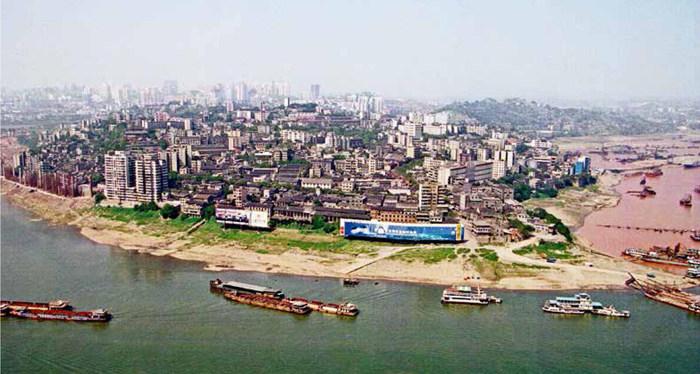
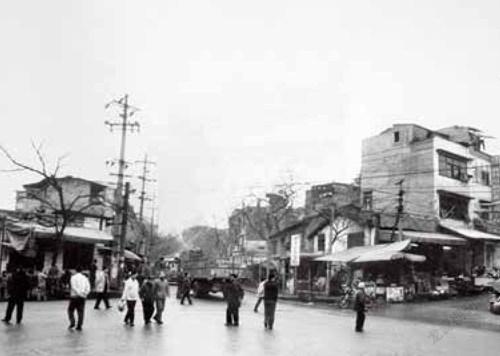

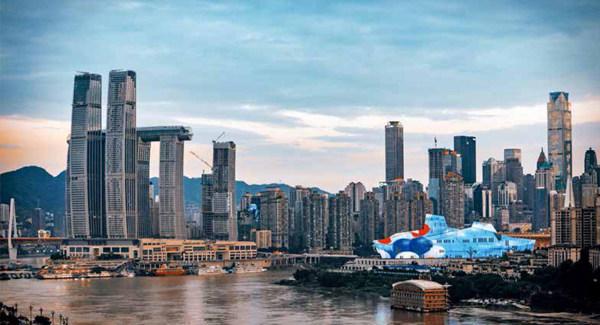
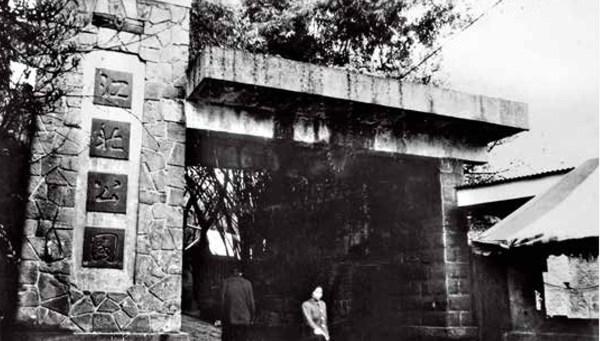

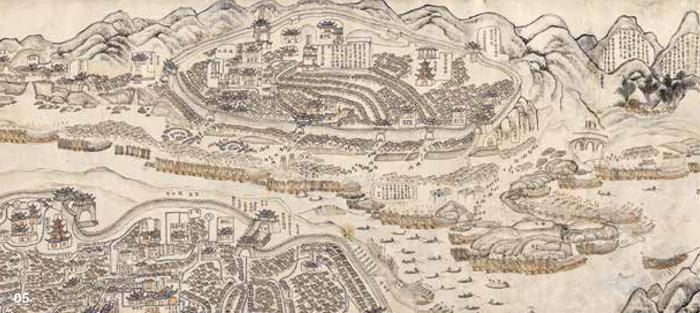
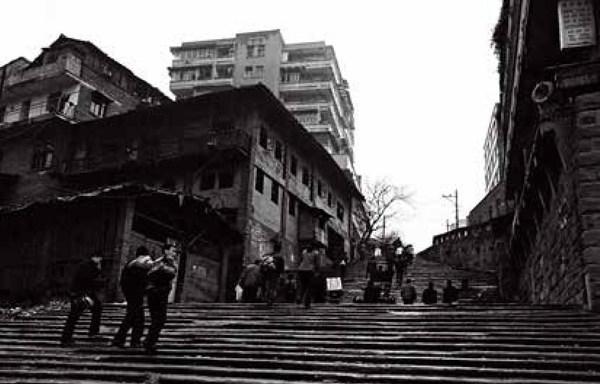
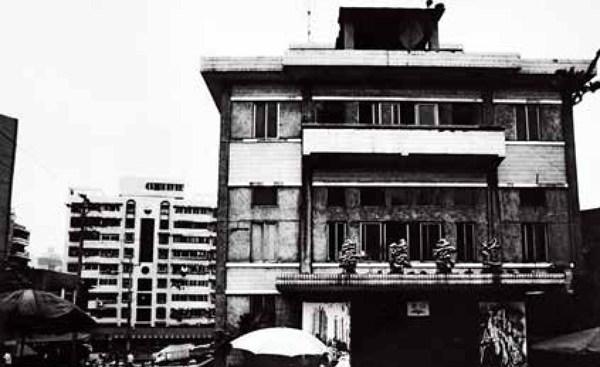

江北城,因位于嘉陵江北岸而得名,秦漢时曾筑“北府城”作为巴郡郡治。
清朝嘉庆三年(1789年),为防白莲教,重筑土墙围城,周长五华里,并设四座城门;道光年间,江北古城完整呈现,城门数量也由四而八;到咸丰十年,江北城再次扩建,十门古城最终形成。
“朗朗文星照九重,问津那许白云封。镇安永远资神护,保定于今际世雍。沿岸金沙随浪涌,汇川火井衬波浓。觐阳红日东升处,恰对涂山第一峰。”清代诗人黄勋曾这样描绘江北城的繁荣景象。
岁月悠悠,江北城的城门和老城墙先后垮塌或被拆除,如今只剩下保定门、东升门、问津门和一小段残墙。
一如黄花园没了园、上清寺没了寺、观音桥没了桥、海棠溪没了溪,江北城也不见了当年城墙合围的那座城。充满烟火气的街巷、喧闹的工厂不复存在,取而代之的,是开阔的绿地和金融中心林立的高楼。
如今,我们还可以从轨道交通6号线的到 站提示音里听到“江北城”三个字。作为地名,这三个字代表了嘉陵江北岸的这片区域;而在老江北城人心里,这三个字是走不出的记忆之城。
Just as the Yellow Garden without a garden.the Shangqing Temple without a temple, theGuanyin Bridge without a bridge, Haitang Creekwithout a creek, Jiangbei City has also lost itscity once surrounded by the wall. Also gone werethe noisy streets and factories. which have beenreplaced by open green spaces and high-risebuildings lined in the financial centers.
Now we can only hear the word "JiangbeiCity" from the notice of rail transit Line 6reminding passengers to get off. As the name ofa place, the two words represent this area on thenorth bank of Jialing River. Yet in the hearts ofthose who lived in the old Jiangbei City, they arethe city of memory that cannot be walked out.
推开记忆之门
Push Open the Door of Memory
六月的一个周末,绵绵细雨中,王大爷和老伴陈大妈再一次来到江北城。自2003年从江北城搬到五里店,“回去看看”已成老两口闲暇时的固定项目。在这里,他们曾经一起生活了二十多年。
顺着重庆大剧院旁的石梯往下,一段老城墙掩映在绿树中。
城墙的墙体用方正的条石垒成。底部斑驳的老石材,自两百年前垒石筑城起,就在这里经受风雨侵蚀。几处城墙的石缝里,盘扎着老黄葛树粗壮的根须。在城墙前,有几位老人说说笑笑地在拍照,听他们言语,应该也是老江北城的故人。
在城墙上信步,没多远就到了头。从剥蚀的石阶走下城墙,便是185岁“高龄”的保定门。
保定门是典型的券顶双拱门,宽2.5米、高3.85米、厚近4米,在今天看来,已不复当年的伟岸。透过保定门的门洞望去,门外便是日夜流淌的嘉陵江。江对岸,朝天门的来福士高耸入云。
“这里和对岸,就像两个世界。”王大爷喃喃地说道。
One weekend in June. in the drizzle. UncleWang and his wife Aunt Chen came to Jiangbei Cityagain. "Going back and having a look" has become aregular item for the old couple in their spare time sincethey moved from Jiangbei City to Wulidian in 2003.Here, they once lived together for more than 20 years.
Down the stone ladders beside Grand Theaterof Chongqing, a section of old city wall is hidden ingreen trees.
The wall is built of square stones. Themottled old stones at the bottom have been erodedby wind and rain since the wall was built 200years ago. In the stone crevices. there are thickroots of the old ficus virens. In front of the citywall. several elders were taking photos, talkingand laughing. Juding from their words, theyshould once live here.
Rambling on the wall to the end, walkingdown from the denuded stone steps, you will see the185-year-old Baoding Gate.
Baoding Gate is a typical double arch witha coupon top, 2.5 meters wide. 3.85 meters highand nearly 4 meters thick. which looks no longeras majestic as it used to be. Looking through thedoorway of Baoding Gate, what comes into viewis Jialing River which flowing day and night.On the other side of the river. the Raffles City atChaotianmen toweres into the sky. “Here and the other side are just two worlds.”Uncle Wang murmuerd.
寻觅旧城时光
Looking for Time in the Old City
从保定门沿路而上,沿途是重庆大剧院和嘉陵江索道北塔楼、重庆科技馆。在江北嘴中央商务区中央公园B区,几对小青年正在德肋撤天主教堂和基督教福音堂前拍摄婚纱照。
“这两座教堂都是后来搬迁过来的。当年,这里是江北公园,可以喝盖碗茶、跳交谊舞。”除了喝茶,这里还是王大爷和陈大妈“耍朋友”的地方。
“结婚之前,我住男工宿舍,她住女工宿舍。中间正好隔着江北公园。”王大爷说,正因如此,江北公园成了二人约会的首选地。“每次约会,我都会去接她。进不了女工宿舍,我就蹲在宿舍值班室门外等,后来,值班室的老大姐把我认熟了,就让我到值班室里坐着等。”
结婚后,两人安家在下横街。下横街在现在重庆大剧院一带,虽是一排排墙壁斑驳、木门陈旧的老平房,但在王大爷的心里,却装满了浓浓的人情味。 “一家炒回锅肉,可以香透八九家,总会有李家大姐、刘家小哥端着饭碗来尝上一口。”
“在江北公园和下横街之间,有一个‘江北剧场’可以听川剧、看电影。只是那个年代影片少,剧场里都是新电影老电影交替着放,看一场电影一角五分钱。”这也是老两口甜蜜的记忆。
下横街往上,就是上横街。“一到夏天,上横街就会有很多‘光膀子黑脸包公’。那会儿,家家户户烧水做饭都用蜂窝煤。每隔十天半个月,家里的男人们就会带上煤票和箩筐、扁担,到上横街的煤店去挑蜂窝煤。”
上横街除了煤店,还有当年两口子工作的重庆织布厂。鼎盛时,织布厂有员工两三千,人称“江半城”。1982年,重庆织布厂扩建厂房,挖掘机突然挖到一块巨大的石碑——沉睡了616年的大夏国皇帝明玉珍墓就此重现人间。
1997年,重庆织布厂解体,厂址内只有明玉珍睿陵被完好地保存下來。
如今,这个江北城的最高点,成为江北嘴中央商务区中央公园A区。
Go up the road from Baoding Gate, along theway are Chongqing Grand Theatre. North Tower ofJialing River Cableway and Chongqing Science andTechnology Museum. In Block B of the Central Parkin Jiangbei Mouth Central Business District. severalyoung people are taking wedding photos in front of St.Theresa's Church and Christian Evangelical Church.
"Both churches were moved later. This wasJiangbei Park then. where we could drink Gaiwantea and practice ballroom dancing." What's more.it's also the place where Uncle Wang and Aunt Chen"make friends".
"Before we got married. I lived in the men'sdormitory and she lived in the women's. In the middlewas the Jiangbei Park." Uncle Wang said. It thusbecome the first choice for them to date. "I'll pick herup every time we date. As I couldn't get into the femaleworkers' dormitory,I squatted outside the duty roomof and waited. Later, the elder sister of the duty roomrecognized me and let me wait in the duty room."
The two settled down in Xiaheng Streetafter getting married. The street lies near today'sChongqing Grand Theater. Although lived in oneof the rows of old bungalows with mottled wallsand old wooden doors. it is full of warmth in UncleWang's heart. "The savory smell of twice cookedpork can travel far away from a house to eight to ninehouses. Then there'll always be a sister Li and brotherLiu come for a taste taking their own rice bowls."
"Between Jiangbei Park and Xiaheng Street,there's a 'Jiangbei Theater' where we listened toSichuan Opera and watched movies. As there werefew film in those days, new films and old ones wereplayed altemately. each cost 15 cents." This is also asweet memory of the couple.
Walking up the Xiaheng Street, you'll get toShangheng Street. "In summer. there were a lot of'shirtless black-face Bao Gong' on the street. At thattime, every household used honeycomb briquet toboil water and cook. Every ten or fifteen days. themen in the family would bring coal tickets. basketsand pole to the coal shop on Shangheng Street topick honeycomb briquet."
In addition to the coal shop, the ChongqingWeaving Factory where the couple once worked alsosit in Shangheng Street. At its peak. the factory had 2,000to 3,000 employees, hence the name "Half JiangbeiCity". When Chongqing Weaving Factory expandedits factory in 1982. excavators suddenly dug up a hugestone tablet - the tomb of Ming Yuzhen the emperor ofthe Daxia Kingdom, which had been sleeping for 616years, reappeared in the world.
In 1997. Chongqing Weaving Factorydisintegrated, and only the Rui Mausoleum was wellpreserved.
Today, the highest point in Jiangbei City hasbecome Area A of the Central Park in JiangbeizuiCentral Business District.
消失的老地名
Disappearing Old Place Names
2003年10月12日,下橫街的三栋楼房轰然倒下,成为江北城大规模拆迁的第一爆。这也是当时主城区规模最大的一次爆破,王大爷一家就在这一年搬出了下横街。
江北城开始了转变。6万人居住的江北城成了财富汇聚的“江北嘴”,“江北城”三个字出现在“江北城隧道”“江北城立交”“江北城大街”这些新地名里,但城里的那些老街老巷,却渐渐成了人们口中的传奇。
“在重庆方言里,‘伞’叫做‘撑花’。江北城里有这样一条街,清末民初时,街上的住户大都以制作雨伞为业,所以取名‘撑花街’。”王大爷说,江北城的每个老地名背后都有故事,就以行当为例,除了撑花街,江北城还有两条街也因行当而得名。
一条是原重庆织布厂附近的洗布塘街。街上有个水塘,因为有织布人家在水塘洗涤色布而得名。
另一条则是金沙打铁街,现在叫金沙门路。“重庆开埠后,江北嘉陵江边有很多木船修造厂。给船厂打船钉铁锔、给百姓打火钩火钳的铁匠铺大多集中在金沙街。街上终日炉火熊熊,叮叮当当,江对岸朝天门、千厮门、临江门一带也能听到。金沙街就被叫成了打铁街。新名旧姓加在一起,就有了金沙打铁街。”
虽然这些街巷,连同彻夜的炉火、热闹的叫卖声,都已消逝在时光的长河中,但也有一些街道被保留了下来,尽管风景已变了模样。
穿过中央公园B区,湿润的空气中有暗香浮动。“桂花街!”陈大妈脱口而出,“从清末起,这里就叫桂花街了,因为这里有一片桂花树。”
眼前的桂花街,两旁依旧栽着桂花树。或许树已不是当年的那些树,但因了这些树,桂花街才依旧是名副其实的桂花街。每当花开时节,微风吹过,沁人的花香弥散整条街道,就像当年一样弥散在老江北城人的心里。
岁月悠悠,桂花街上花香如故,保定门外江声依旧。它们陪伴江北城一路走来,也将继续见证江北城日新月异的未来。
On October 12. 2003. three buildings inXiaheng Street collapsed, becoming the firstexplosion of large-scale demolition in Jiangbei City.It was also the largest explosion in the main urbanarea at that time. and in the same year. Uncle Wang'sfamily moved out of Xiaheng Street.
Jiangbei City began to make a change. JiangbeiCity inhabited by 60,000 people, has become the"Jiangbeizui" where a great deal of wealth gathers,leaving the words "Jiangbei City" appearing onlyin new place names of "Jiangbei City Tunnel"."Jiangbei City Interchange" and "Jiangbei CityStreet". However. the old streets and alleys in the cityhave gradually become legends in people's heart.
"In Chongqing dialect. 'umbrella' is called'supporting flowers'. In late Qing and early Republicof China. there's a street in Jiangbei City, most of theresidents in the street made a living by producingumbrellas. So it was named 'Chenghua Street"'.Uncle Wang said that there are stories behind eachold place name in Jiangbei City. In addition toChenghua Street. two other streets in Jiangbei Cityare also named after their trade.
One is Xibutang Street near the formerChongqing Weaving Factory. There is a pond in thestreet. where weavers used to wash colored cloth.That's why it is called Xibutang Street.
The other is Jinshadatie Street. now calledJinshamen Road. "Afier Chongqing opened its port.many a wooden boat repair factories showed upalong the Jialing River in Jiangbei City. Most of theblacksmiths' shops that nail ships and iron cunumfor shipyards and fire hooks and poker tongs for thecommon people are concentrated in Jinsha Street.The streets are full of fires and tinkling all day long.The noise was so loud that they even could beenheard at Chaotian Gate, Qiansi Gate and LinjiangGate on the other side of the river. Jinsha Street thusgot the name Datie Street. The new and old namesputting together. we then have the Jinshadatie Street."
These streets. together with the all-night firesand the bustling cries, have all disappeared in thelong river of time. Some, though preserved. nowhave totally different scenenes.
Walking through Block B of the Central Park.there's a faint fragrance floating in the humid air."Guihua Street!" Aunt Chen blurted out. "Since theend of the Qing Dynasty, this place has been calledGuihua Street because there's a osmanthus forestry."
Today's Guihua Street still has osmanthus treesplanted on both sides. Perhaps they are no longer thetrees in those years, but because of them Guihua Streetbecomes the real Guihua Street. Whenever the flowersbloom. the refreshing fragrance of flowers diffusesthrougout the street as breeze blows, pervading in thehearts of the old residents of Jiangbei City.
Time goes by, yet the fragrance of flowers inthe Guihua Street remains. and the sound of riveroutside Baoding Gate lingers. Accompanied JiangbeiCity along the way, they will also witness the ever-changing future of Jiangbei City.
